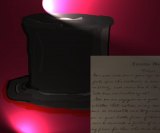Folklore shrouds writing of Gettysburg Address

This is one of the myths about the legendary Gettysburg Address, “based on decades of rumors and folklore,” according to the National Constitution Center.
Lincoln was smart enough to prepare for the speech well beforehand. “In fact, he’d been working on his remarks ever since receiving the invitation,” History.com reports. Like the rest of the nation, “he’d had nearly five months to let the enormity of the battle’s costs sink in.”
The address was delivered 150 years ago, Nov. 19, 1863. It was about 270 words but widely considered a political and literary masterpiece. There are nine versions of the speech. In some versions, Lincoln includes the words “under God” in the last line.
“The Associated Press report of the speech, written by Joseph Gilbert, along with reports from newspapers in Philadelphia and Chicago, all agree that Lincoln said “under God” as his speech concluded,” according to the Constitution Center.
Lincoln wasn’t the main speaker during the commemoration. The star was Edward Everett, a famed Massachusetts orator. Afterward, Everett realized that Lincoln’s speech was a masterstroke. On November 20, he wrote to Lincoln: “Permit me also to express my great admiration of the thoughts expressed by you, with such eloquent simplicity & appropriateness, at the consecration of the Cemetery. I should be glad, if I could flatter myself that I came as near to the central idea of the occasion, in two hours, as you did in two minutes.”
Lincoln’s words made an impact, writes Drew Gilpin Faust, president of Harvard, in The Washington Post.“I often wonder if the North would have fought, if the ranks would have filled, if there had been a different president — one less able to articulate the war’s meaning and purposes with an eloquence that grew alongside the war’s costs and sacrifices.”
The Gettysburg Address
The following version of the Gettysburg Address is the one most often reproduced, notably on the walls of the Lincoln Memorial in Washington.
Four score and seven years ago our fathers brought forth on this continent, a new nation, conceived in Liberty, and dedicated to the proposition that all men are created equal.
Now we are engaged in a great civil war, testing whether that nation, or any nation so conceived and so dedicated, can long endure.
We are met on a great battle-field of that war. We have come to dedicate a portion of that field, as a final resting place for those who here gave their lives that that nation might live. It is altogether fitting and proper that we should do this.
But, in a larger sense, we can not dedicate -- we can not consecrate -- we can not hallow -- this ground. The brave men, living and dead, who struggled here, have consecrated it, far above our poor power to add or detract. The world will little note, nor long remember what we say here, but it can never forget what they did here.
It is for us the living, rather, to be dedicated here to the unfinished work which they who fought here have thus far so nobly advanced. It is rather for us to be here dedicated to the great task remaining before us -- that from these honored dead we take increased devotion to that cause for which they gave the last full measure of devotion -- that we here highly resolve that these dead shall not have died in vain -- that this nation, under God, shall have a new birth of freedom -- and that government of the people, by the people, for the people, shall not perish from the earth.
Related:
What Lincoln's Gettysburg Address and Washington's Mount Vernon have in common

